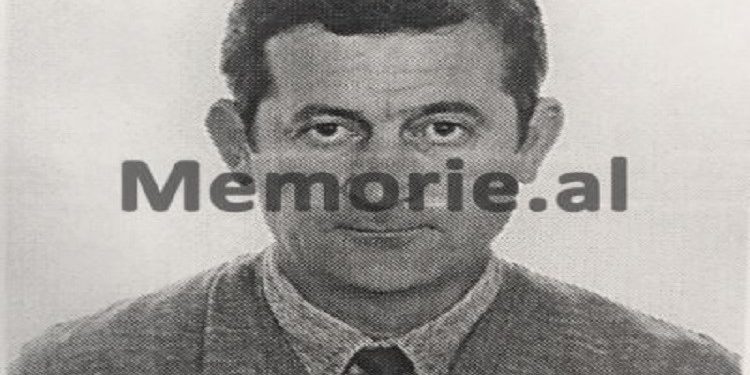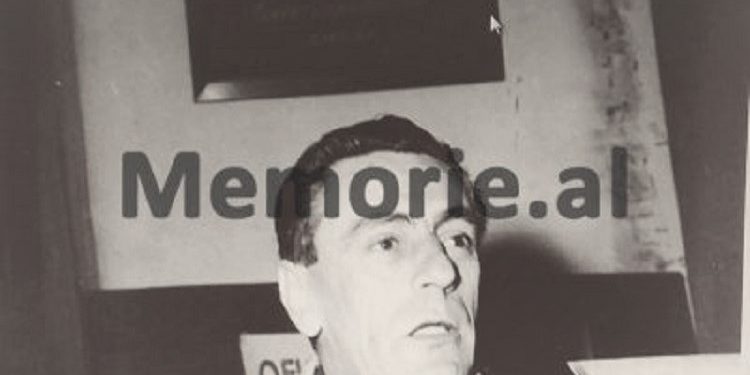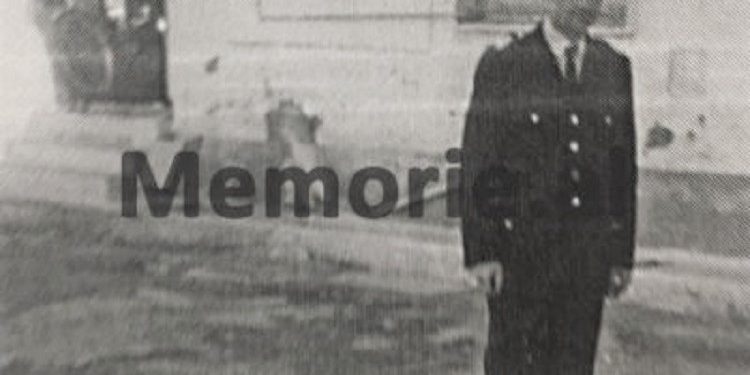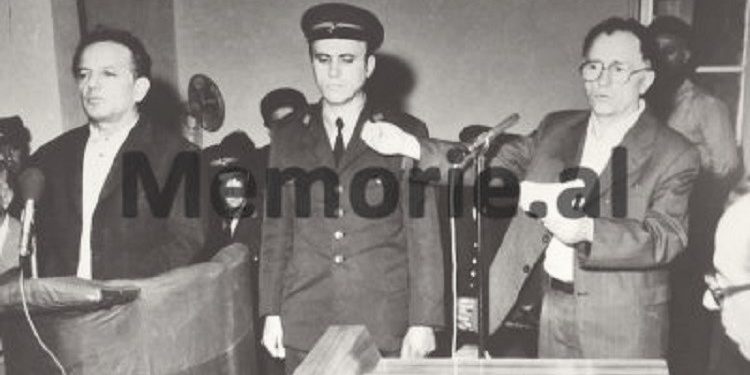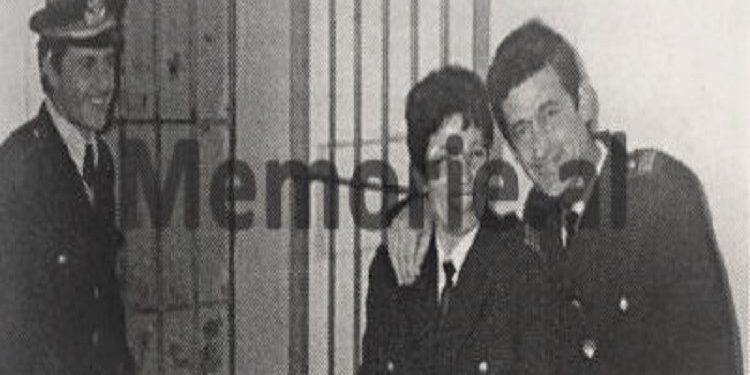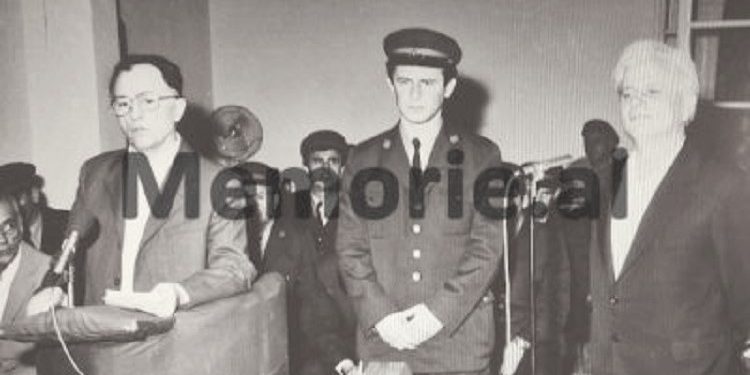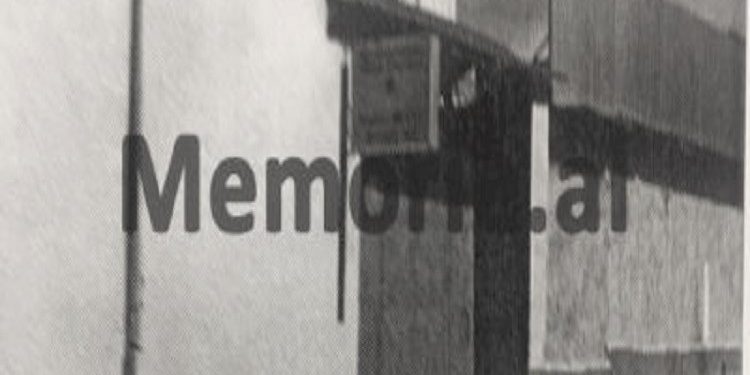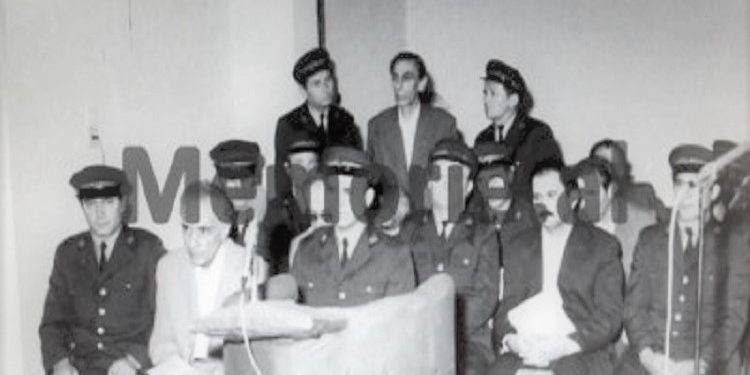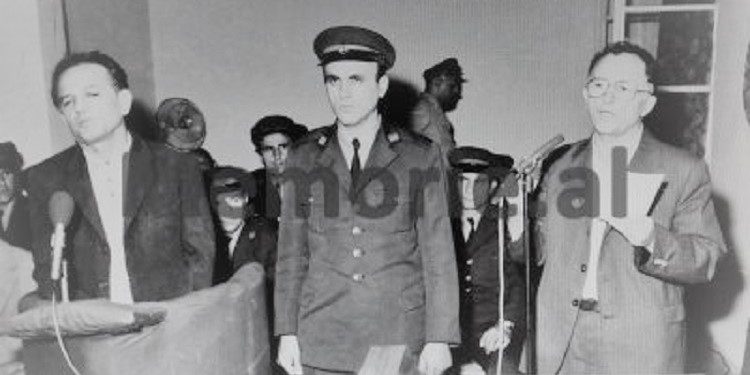Dashnor Kaloçi
Memorie.al publishes the unknown history of the investigative process that took place against the former Minister of Interior Kadri Hazbiu in the premises of the Tirana prison or as it was otherwise known: Ward 313, from October 1982 until September 14, ’83, when he, along with Feçor Shehu, Llambi Ziçishti and Llambi Peçini, were taken under strict security measures to be executed somewhere in a secret place on the outskirts of the capital, near the village of Linza. The testimony of the former police officer, Sazan Demollari, regarding the personnel who were selected for the security of that prison, the orders given by the command, how long Hekuran Isai stayed there in prison and how former Minister Kadri Hazbiu and other members of that group were treated , what special message had Enver Hoxha given to Hazbi… ?!
Kadri Hazbi was placed in a special cell, which was located on the second floor of the prison building, where its small windows overlooked the southeast. Likewise, all the other detainees of that group, such as Feçor Shehu, Fiqret Shehu, Llambi Ziçishti, Nesti Nase, Llambi Peçini, etc., were placed on the second floor of the prison building, in some special cells, with stairs very high security, where the interception technique was installed”. This is how former police officer Sazan Demollari remembers the isolation of former Interior Minister Kadri Hazbiu and other members of his group in Prison 313 in Tirana, where he served for more than 20 years as a guard. How were Hazbiu and the other members of that group treated in that prison and what message did Enver Hoxha give to Kadri? Regarding these and other events that took place in Prison 313 of Tirana, in the period January 1982-September 1983, when that group was kept isolated, the former police officer Sazan Demollari, who served in that prison, told us about Memorie.al until 2001.
Mr. Sazan, when did you first start your service in ward 313, or as it is otherwise known: Tirana prison?
For the first time in that ward I started the service in the beginning of December 1981 and I went there after I had done for three months, a very intensive training in one of the special wards of the Ministry of Interior, which was located on the outskirts of the city of Ballsh. The training we conducted in that ward was very special and apart from us, that kind of training at that time was performed only by one unit of the Republic Guard. That exercise can be compared to what commandos do today.
What were the criteria for those officers who conducted that exercise with you in Ballsh?
In that training center, the Ministry of Interior had gathered carefully selected soldiers and non-commissioned officers, by family biographies, as at the end of them they were sent to perform very special services, of special importance, in different units of the camps and prisons, such as Qafë-Bari in Puka, Batërr e Martaneshit, Spaçi i Mirditës, Bulqiza, Torovica e Lezhës, Përparimi i Saranda, Porcelani and 313-a in Tirana, etc.
When did you go to Ward 313 in Tirana and what were the first instructions given by the command?
At the time we went to that ward he was commanded by Commissar Imer Malo and Hafuz Murati, who was commanded in the function of commander. But at that time, Commissioner Imer Malo (originally from Vlora) was dealing with us non-commissioned officers and soldiers, as Commander Hafuz Murati was staying inside the prison. So the first orders and instructions we received from Commissioner Imer Malo, who was a very good man, very respectful and kind to us soldiers, who loved us like his children. In the first messages he gave us, among other things, he said: “You must keep in mind two things: Here in prison do not enter into conversations with convicts and outside the ward do not make any connection with their families.”
At the time of Mehmet Shehu’s murder or suicide, how did they communicate that event in prison?
The news of Mehmet Shehu’s suicide (as we were told at the time), I learned at 23.00 on the night of December 18, 1981, while I was performing my service at the station no. 4, which was also the most important, as it was very close to the air boxes, where the convicts came out twice a day for an hour. The news was communicated to me by the guard officer, who came to my place together with my squad commander (Agron… from Berat) and told me: “Mehmet Shehu killed himself and be careful to increase vigilance…”. Before he came to my place, I saw many movements in the ward that was next to us (Ward 325) and after that in both wards the readiness was given. The next day we had a meeting where, among other things, the commissioner told us: “Mehmet Shehu has killed himself and according to the orders that have come to us from Comrade Enver, he is an enemy of the people and as such will be punished.”
From the so-called “Kadri Hazbi Group”, who came first to ward 313?
Before the arrest of Kadri Hazbiu’s group, the detainees of the “Tropojan Group”, led by Isuf and Skënder Aluca, were in that prison, who were considered very dangerous, as it was said that their group wanted to to assassinate Ramiz Alia. Whereas from Kadri Hazbiu’s group at the beginning came Fiqret Shehu, with her two sons, Skënder and Bashkim. Their arrival, if I am not mistaken, was in late January or early February 1982, and in the months that followed came others, such as the commander of Mehmet Shehu’s bodyguard, Ali Çeno; the barber of Hotel “Dajti”, with the surname Ahmetaga; Mehmet’s accompanying officer, Gani Kodra; Minister of Interior, Feçorr Shehu, former Deputy Minister of Interior, Mihallaq Ziçishti; Foreign Minister Nesti Nase; Minister of Health, Llambi Ziçishti etc. The last one, who came there to that prison, if I am not mistaken there in mid-October 1982, was Kadri Hazbiu himself. At that time I was not on duty in that prison, as I was training new soldiers in the Ballsh ward, but we learned of Kadri Hazbiu’s arrival when we arrived there on December 2, 1982.
Were they informed of Kadri Hazbiu’s arrival in that prison?
Yes, Commissar Imer Malo informed us, who told us: “Kadri Hazbiu is also in prison here, who was arrested for betraying. “Kadriu together with his people and Xhevdet Mustafa had a goal to overthrow Enver Hoxha”.
Where were Kadri Hazbiu and the other detainees of that group housed?
Kadri Hazbi was placed in a special cell, which was located on the second floor, above the box, where its small windows looked from the southeast. Likewise, all the other detainees of that group were placed on the second floor of the prison building, in some special cells with a very high level of security, where the wiretapping technique was installed.
With the arrival of this group, was the prison service strengthened?
The entire prison service went on full alert. After that, the prison service was reinforced with another company of soldiers coming from the Security Battalion of the Ministry of Interior (rep.324), who were assigned to serve in the outer enclosures of the prison. Likewise, the internal service of the prison was strengthened with many other forces, coming from the staff of the facilities and embassies. At that time we were very close to the leading cadres of ward 313, led by the commander of the police, Pajtim Abedini.
After the arrival of Kadri Hazbi’s group, who commanded in that prison?
Even after the arrival of Kadri Hazbiu’s group, the prison was commanded the same as before, by Imer Malo and Hafuz Murati, but at that time there was also added the Commander of the Ministry of Interior, NS, who was responsible for everything related to the group of Kadri Hazbi, starting from food, sleep, medical examination, service, etc. N.S. was very communicative with us and excelled in strong account demand.
Hekuran came there?
The Minister of Interior, Hekuran Isai, came to the prison almost every night and he worked from 21.00 until 3 or 4 in the morning, a period of time when the investigation was carried out by a special group of investigators.
It was said that Kadri Hazbiu did not speak at all during the investigation process, what do you know about this?
I say that this is true, because that is how we heard at that time, who was serving there. We were even told that Enver Hoxha had instructed: “Be careful with Kadriu, because he is like a mouse, which has done everything without noise”. Kadriu remained silent in the cell and did not create problems during the investigation. Nothing more accurate than what Kadri Hazbiu said, at that time I do not know how to say, as we were categorically forbidden to talk to our colleagues and colleagues about those problems. The conspiracy there was at its highest.
Why, were there others who created problems?
Feçorr Shehu created problems, as he was a very impulsive man.
What about the food and medical control of Kadri Hazbiu’s group, who was responsible?
Their food was very special and it was prepared in a special kitchen, which opened the apostrophe in the premises of the Investigation. As the first cook was a person named Jorgo, who had been brought there from the club of the Ministry of Interior, while his assistant was M. B. from Tepelena. The food they cooked was supervised by the prison doctor, Nevzati, who also took care of the health side of that group. I wanted to say that during the entire period of the investigation of that group, none of the detainees went to the hospital by ambulance, as there was no need. Also during the whole period of the investigation of that group there was no incident in the prison.
Were they tortured?
I do not know what to say about this, because I do not know anything.
When their trial took place, were security measures increased?
Their trial, which began in late August 1982, took place in an improvised room like the courtroom of the Investigation building, on its second floor, which is located on the west side of the prison. Throughout the trial, by order of the command, I removed the soldier guarding the station and instead served with my two colleagues, Agim Veseli from Lezha and Besnik Premçi from Peshkopia. The removal of the soldier was done so that he would not hear what was said there in court. Throughout the trial, which lasted until September 12, we were on standby no. , all permits and freedom of exit for soldiers and non-commissioned officers were banned.
Were you there when Kadri and the other three were taken to be executed?
I was there with service. The four were taken to be executed there at 11.45 pm on September 14, 1982, and were taken out of prison on bail. At that moment, all the prison lights went out, and on the orders given to us by the command, we removed all the guards and locked them in a dormitory so that they could not see what was going on there. Kadri was put in a separate minibus, while the other three were put together in a car.
After they were released from prison, where did they take them and who dealt with their execution procedures?
It is not known, everything, as I said above, was too conspiratorial.
After their execution, how long did the other convicts stay there?
They stayed there for a while and then took them to Burrel. Only Fiqrete Shehu was left in prison, which was placed on the second floor. In addition to the guard inside the cell, there were two other convicted women, who were watching him. Fiqretes was regularly given the newspaper “Zeri i Popullit”, which she then handed over and twice a month, she had a regular meeting with her son Bashkim, who was in Kaush. That meeting took place in the presence of the guards and the commander of the internal prison regime.
What about Halit Bajrami, a member of Xhevdet Mustafa’s gang, did you have him there in prison?
Halit Bajrami, was held there for more than a year, in a special, special room, in the building of the Investigation, whose windows looked from the east. There he had all the necessary conditions and amenities, such as television, books, newspapers, up to central heating and special food. Halit was brought there after the murder of Xhevdet Mustafa and no one was allowed to enter his room. Shortly after the trial ended, he was removed from there and taken to a special room at the 15-storey building (Hotel Tirana) and then to New Zealand. So we heard then about Halit, with whom I had talked several times.
How long have you served at 313?
Until 2001 I saw and experienced in that prison the riots of March 1997.
Testimony of former police officer; who were the two most reliable guards doing the petty checks?!
Regarding the security measures in which Kadri Hazbiu and other members of that group were held in Prison 313 in Tirana, Sazan Demollari states: “Both Kadri Hazbiu and the other members of that group had inside their cells a civilian guard, who also had the primary responsibility for the life of the arrested person. Likewise, starting with Kadriu, and everyone else had a helmet on their head, so as not to attempt suicide by hitting the wall with their head. Unlike the other detainees, Kadri Hazbiu was kept locked in an iron cage, which was prepared and the apostrophes were inserted for his cell. In addition to the civilians inside the cells, in the three sectors where the detainees were located, two police officers were patrolling the corridors, changing every six hours. All the service performed by them, was perfect and was not even thought to abuse the duty in the slightest, as the controls were continuous, both by the command of the ward and by the Ministry of Interior. All the people who were serving inside the prison were brought there by a special minibus, which took them through their houses and this was done so that they would not be compromised and it would not be obvious that they were working there in ward 313. The two main prison guards were Ali Balla and Garip Biçoku, who had years in that profession and were highly credible, for the task assigned to them. On each floor there was a checkpoint with iron doors, where Ali and Garip made a detailed physical check, for every person who entered the prison, starting from the entry sheet, pistols, lighters, knives, nail clippers, and down to small items that were thought to pose a risk. Likewise, the clock was not allowed there and it was done in order to put psychological pressure on the convicts, so that they would not have the notion of time. “Everything had to be handed over there and that control could not escape even the Minister of Interior, Hekuran Isai, or the people who accompanied him” ./ Memorie.al




